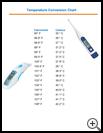
Vital Signs
________________________________________________________________________
KEY POINTS
- Vital signs are measurements of body temperature, heart rate, breathing rate, and blood pressure. Checking your vital signs can alert you to health problems. When you are sick, they are used to help check how you are doing.
- Buy a good quality, digital thermometer. That way, when you are sick, you can check whether you have a fever.
- Check your heart rate if you feel ill, have a fever, feel your heart racing, or take medicines that affect your heart rate. If you don't know how to check your pulse, ask your healthcare provider to teach you.
- Talk with your healthcare provider about what your blood pressure is and what it should be. Keep track of the date, time, BP reading, where it was taken (at home, the drugstore, the clinic), and how it was taken.
________________________________________________________________________
What are vital signs?
Vital signs are measurements of body temperature, heart rate, breathing rate, and blood pressure. Vital signs give information about your general health. They offer clues to medical conditions. When you are sick, they are used to help check how you are doing.
Temperature
Body temperature is measured with a thermometer. There are many types of thermometers that can measure your body temperature in your mouth, ear, armpit, rectum, or on your forehead. Normal body temperature ranges from 97°F (36°C) to 99°F (37°C) or slightly higher. It is normal for a temperature to be a little higher or lower depending on if you take it in your mouth or take it in your ear, armpit, forehead, or rectum.
Body temperature can change due to:
- Time of day (normally lower in the morning than it is later in the day)
- Being stressed or dehydrated (not enough fluid in the body)
- Drinking hot or cold fluids or sitting in a cold room
- Thyroid problems
- Menstrual cycle
- Infections
- Being active, such as running or walking quickly
Your body may not control temperature as well as you age. For example, being in a hot place can cause a dangerous increase in body temperature in older adults. On the other hand, infants and older adults may be very ill without having a fever.
Heart Rate
Your heart rate is the number of times your heart beats in a minute. It is also called your pulse. The pulse is usually easiest to feel at the wrist or at the neck. For most people, the heart rate should be between 60 and 100 beats per minute when resting. People who are very physically fit may have a normal pulse lower than 60.
Pulse rates can change due to:
- Infections
- Anxiety, stress, excitement, or anger
- Medicines, supplements, or caffeine
- Exercise
- Pain
- Thyroid problems
- Some heart problems
- Anemia (a low level of red blood cells)
Your heartbeat should be regular, without any missed beats or extra beats. If you have lost a lot of blood or are very sick, you may have a fast, weak pulse that is hard to feel. Hearts that are working very hard may produce an unusually strong heartbeat.
Breathing Rate
Your breathing rate is the number of times you breathe in during a minute. It’s also called your respiratory rate. Your rate of breathing can vary widely during the day. Breathing is usually a bit slower during sleep. The best time to check your breathing rate is when you are resting.
The normal adult rate is 12 to 20 breaths per minute. Breathing rates can change due to:
- Exercise
- Anxiety, stress, excitement, or anger
- Laughter
- Lung infections or coughing
- Surgery
- Narcotics
Breathing that is unusually slow or fast can be a sign of a serious problem.
Blood Pressure
Blood pressure is the force of blood against artery walls as your heart pumps blood through your body. Blood pressure is borderline high if it is 120/80 or higher but less than 140/90. For most people, high blood pressure is 140/90 or higher. If you have chronic kidney disease, a blood pressure more than 130/80 is considered too high.
Blood pressure can rise and fall with exercise, rest, or emotions.
High blood pressure is a very common problem. The longer you have high blood pressure and the higher it is, the more likely it is you will develop problems such as hardening of the arteries, heart failure, or a stroke. Low blood pressure is uncommon.
Should I check my own vital signs?
Checking your vital signs can alert you to health problems. Here are some examples of things you can do:
- Buy a good quality, digital thermometer. That way, when you are sick, you can check whether you have a fever.
- Check your heart rate if you feel ill, have a fever, feel your heart racing, or take medicines that affect your heart rate. If you don't know how to check your pulse, ask your healthcare provider to teach you.
- Talk with your healthcare provider about what your blood pressure is and what it should be. One high blood pressure reading may be caused by an error with the machine or feeling nervous at the healthcare provider's office. Several high readings over several hours or days may be a sign of a problem. Keep track every time your blood pressure is taken. Note the date, time, BP reading, where it was taken (at home, the drugstore, the clinic), and how it was taken. Talk to your healthcare provider about how to lower your blood pressure if it is too high.
- You usually do not need to check your breathing rate unless your healthcare provider recommends that you do so.

